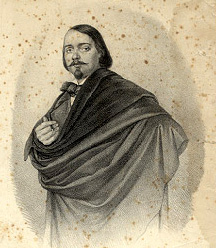| Poliuto | |
|---|---|
| Opera by Gaetano Donizetti | |
 Carlo Baucardé in the title role in 1848 | |
| Librettist | Salvadore Cammarano |
| Language | Italian |
| Based on | Polyeucte by Pierre Corneille |
| Premiere | 30 November 1848 Teatro San Carlo, Naples |
Poliuto is a three-act tragedia lirica (or tragic opera) by Gaetano Donizetti from the Italian libretto by Salvadore Cammarano, which was based on Pierre Corneille's play Polyeucte written in 1641–42. It reflected the life of the early Christian martyr Saint Polyeuctus.[1]
Regarded by one author as Donizetti's "most personal opera" with the music being "some of the finest Donizetti was to compose",[2] Poliuto was written in 1838 for performances planned at the Teatro San Carlo in Naples later that year. However, close to the time for rehearsals to begin, King Ferdinand II refused to allow the martyrdom of a Christian saint to be seen on stage and forbade the production.[3]
Angry at the decision and with a commission for the Paris Opéra due from the composer, Donizetti paid the penalty to the San Carlo for not producing an original work as a substitute, and left Naples for Paris arriving on 21 October.[4] As his first commission for Paris, he decided to revise Poliuto and between 1839-40 a French text, with the title Les martyrs, was prepared by Eugene Scribe which conformed to the conventions of a French four-act grand opera, but which incorporated 80% of the music from Poliuto.[3] It was presented in Paris on 10 April 1840. When eventually given in Italy, it was initially presented in a translation from the French version under the title of I martiri. It took until 30 November 1848, months after the composer's death, in order for Poliuto to finally appear for six performances at the San Carlo in its original Italian three-act version.[5]